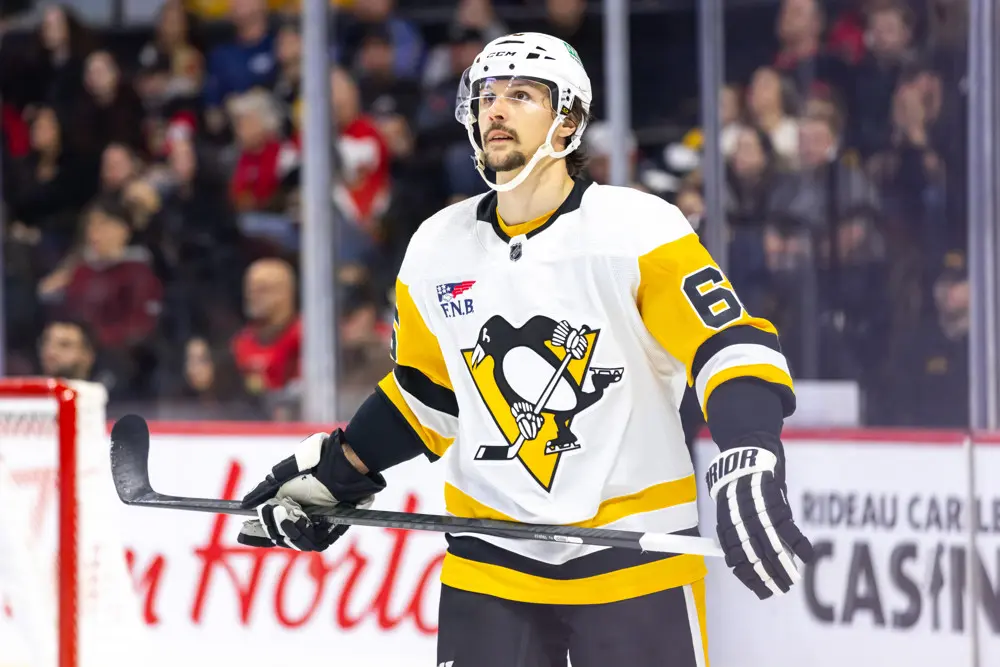Penguins
Kingerski: Something Has to Give Between Erik Karlsson, Penguins

It’s not simply an adjustment. The Pittsburgh Penguins and Erik Karlsson are coexisting peacefully peacefully. Both sides are compromising, but it seems neither side is getting what they want.
Karlsson’s slightly cryptic answer about overtime losses only underscored the sense of frustration.
“We’re fine for 60 minutes, why (we struggle in OT), you’ll have to ask someone else,” Karlsson said.
After 41 games, it’s not been bad enough to say the marriage of Karlsson to the Penguins isn’t working, but it could be — should be — much better.
Something has to give.
Penguins coach Mike Sullivan and president of hockey operations/GM Kyle Dubas have praised Karlsson for his willingness to speak up in meetings and behind the scenes to question tactics or dissect his role in them. Yet those comments have always raised the question of whether Karlsson is buying in.
Is he trying to play his game or theirs?
“Overall, I feel really good about myself. I think I’m in a good spot,” said Karlsson. “Obviously, I would like to accomplish a little bit more sometimes and create a little bit more out of nothing. Hopefully, that might come.”
For nearly two decades, the Penguins’ defensemen have had two jobs: Defend and get the puck to Sidney Crosby and Evgeni Malkin.
Neither task is Karlsson’s game.
An important point to maintain context is the Penguins’ trade. They acquired Karlsson on Aug. 6. Regardless of how Karlsson performs in the long term for the Penguins, it was a masterful transaction that improved the team. There can be no revisionist history that it was a bad trade.
The Penguins sacrificed a first and second-round pick. They also gained the Sharks’ 2026 third-rounder while clearing about $10 million of unwanted salaries in Mikael Granlund, Jeff Petry, and Jan Ruuta to acquire the three-time Norris Trophy winner. Should the Penguins and Karlsson part before the expiration of his contract, which has three more years beyond this season, Dubas will easily recoup what he spent, if not more.
But the outcome both are hoping for is far more positive and ends in 34 pounds of silver.
However, it’s not headed in that direction. The Penguins aren’t even in a playoff spot.
The power play and the overtime struggles loom large on the Penguins’ predicament. They have won only three of nine overtime games, and after Saturday’s 0-for on the power play, they fell to an abysmal 13.9% conversion rate. Even worse, the man-advantage failed to generate anything of consequence.
Erik Karlsson is inexorably tied to its success and its failure. It’s not exclusively on Karlsson — there are clearly others, such as Evgeni Malkin, struggling — but Karlsson is the leader of the power play.
“Well, it’s not good enough right now. It has to be better,” was all Sullivan said Saturday night.
In the bigger picture, the Penguins’ 3-2 overtime loss to the Carolina Hurricanes was another case of the disconnect between Karlsson’s game and the Penguins’ game. The power play wasn’t just 0-for-4; it failed to establish zone time, including on a two-man advantage late in the second period.
At the time, the Penguins trailed 2-0. A goal or at least momentum would have lifted the team.
Instead, Carolina dominated the first five minutes of the third period and nearly put the game away. The Penguins needed more terrific saves by Tristan Jarry, who was the difference between earning a point and getting blown out.
The puck was on Karlsson’s stick through center ice, and the lack of zone entries rested with the power play QB, Karlsson.
Carolina also seized on the Penguin’s mistakes and bad decisions, getting about 10 odd-man rushes. Karlsson had a big hand in that part, too.
“There’s no denying that they play a certain way. Even though you know that and you try and prepare for that, sometimes you’re going to end up in between,” said Karlsson. “They’re going to get bounces that they’re looking for because that’s the way they play.”
Last season, Karlsson was the first defenseman in more than 30 years to score 100 points. He played for the woefully bad San Jose Sharks. The puck was his to keep or distribute as he saw fit in all situations.
This season, Karlsson is on pace for a healthy 60 points and 14 goals. Yet nothing feels settled or in the right place. The Penguins have several players who command the puck, including Crosby and Malkin, but there’s only one piece of vulcanized rubber to share.
“He’s a dynamic player, and I think his impact on our ability to generate offense is significant. Having said that, I think there’s another level to it, also,” Sullivan said on Jan. 7. “His body of work in the league suggests that. I think we anticipated an adjustment process coming into a new team with (Karlsson). I think he’s getting more comfortable with understanding how he needs to play in order to make an impact on the game.”
The Pittsburgh Penguins season is still teetering between rising toward a crescendo and epic failure. The overtime loss means the Penguins are 7-2-3 in their last 12, which is a healthy pace that cannot be overlooked.
With a few more power-play goals, the Penguins would solidly be in a playoff spot.
Perhaps a bit more free-range Karlsson with a defense partner able to cover him would yield a few more important tallies, too.
Still, it feels like there’s a lot more both sides want from the other but aren’t getting, even if neither side is willing to say it.
Something has to give.













